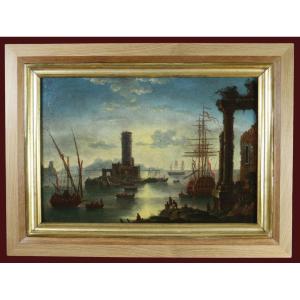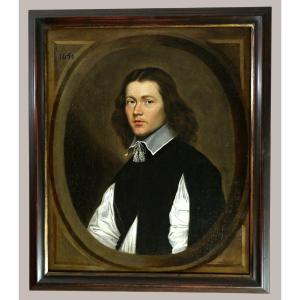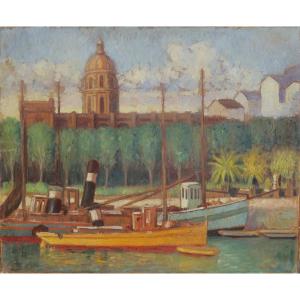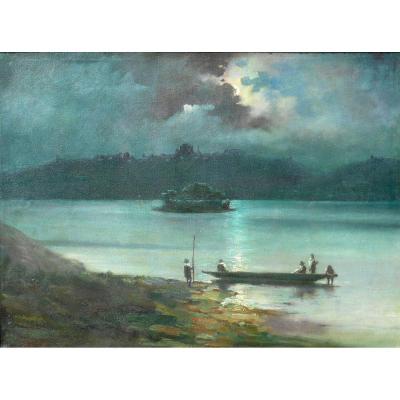Oil on mahogany panel measuring 73.5 cm by 47 cm.
Important old frame measuring 101 cm by 73 cm.
This beautiful Vedute reproduces, with variations and a smaller format, a work by the painter Gaspar van Wittel (1653-1736) from 1714, sold by Sotheby's on July 8, 2021 in London.
We are at the end of the grand canal, bustling with numerous boats, at the Basilica of Santa Maria della Salute.
Gaspar van Wittel (1653-1736)
[…] Gaspare Vanvitelli, or Gaspare degli Occhiali, as he was also called in Italy where he is first recorded in 1675, was born Gaspar Adriaansz. Van Wittel in Amersfoort was undoubtedly the most influential vedutist of his generation in Italy. Like many northern painters, he settled in Rome, where he remained until his death in 1736. Vanvitelli's views were developed from the precise and often very detailed drawings he made during his trips to Italy. By the early 1690s he had learned how to use them most effectively, reproducing successful compositions according to specific clients or the market as a whole. He clearly understood that his clients wanted accurate views of the major cities and other sites they visited, and he honed his craft with this goal in mind. His successful exploitation of the genre was obviously recorded by artists in Venice and had a significant influence on the careers of Carlevarijs and Canaletto, and therefore indirectly on those of Marieschi, Bellotto and Guardi. Panini in Rome was even more directly indebted to Vanvitelli's example. Vanvitelli is believed to have traveled to northern Italy before 1690. The earliest of his dated paintings of Venice, a View of the Molo from the Bacino dates from 1697. Except for unique views of St. Mark's Square and the Piazzetta, and three related images of the island church of San Michele and Murano, all of Vanvitelli's Venetian views were taken from viewpoints of the Bacino between the Molo, the island of San Giorgio and the mouth of the Grand Canal. These include the eight recorded variants of the 1697 composition, five of which are undated, while others date from 1706 and 1717. Vanvitelli must have been particularly struck by the majestic and spectacular church of Santa Maria della Salute de Longhena, seen in almost half of his Venetian views. […] The artist painted five variations on the central part of the composition from the same point of view, with the Punta della Dogana and the church: four of them were small, while a larger one is in the Torlonia Collection in Rome. (Sotheby's, Clémentine Sinclar, 2021).





























 Le Magazine de PROANTIC
Le Magazine de PROANTIC TRÉSORS Magazine
TRÉSORS Magazine Rivista Artiquariato
Rivista Artiquariato
